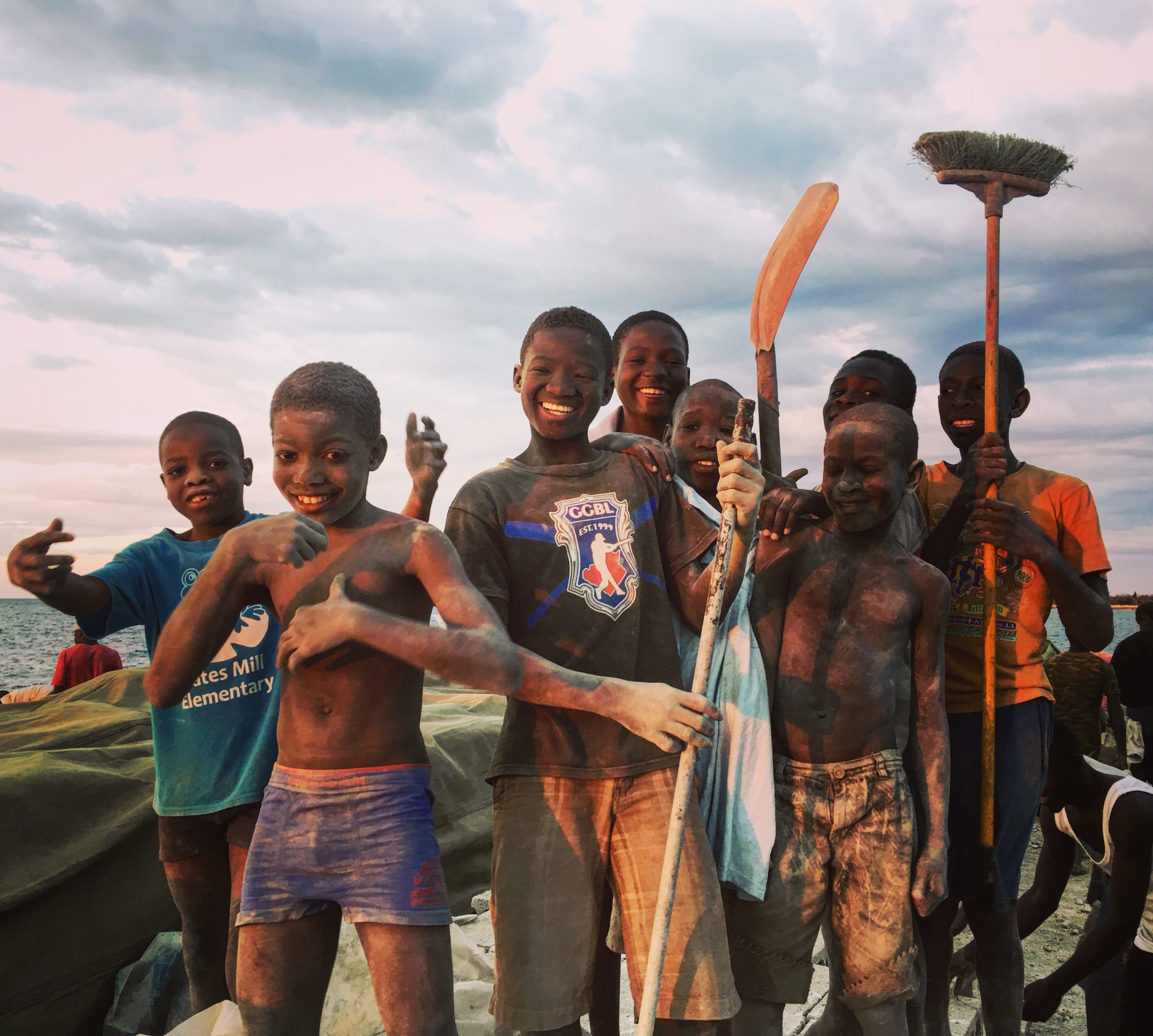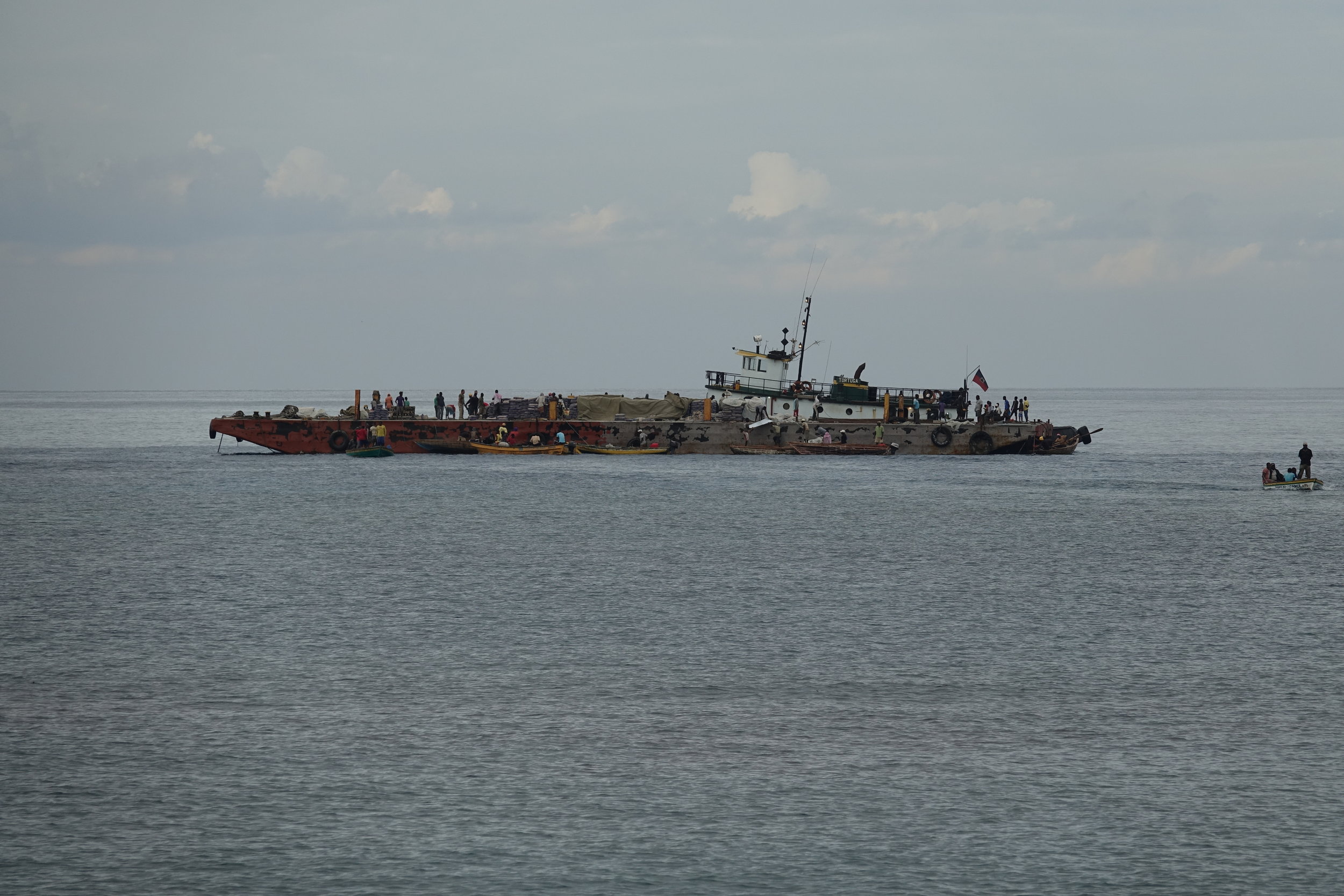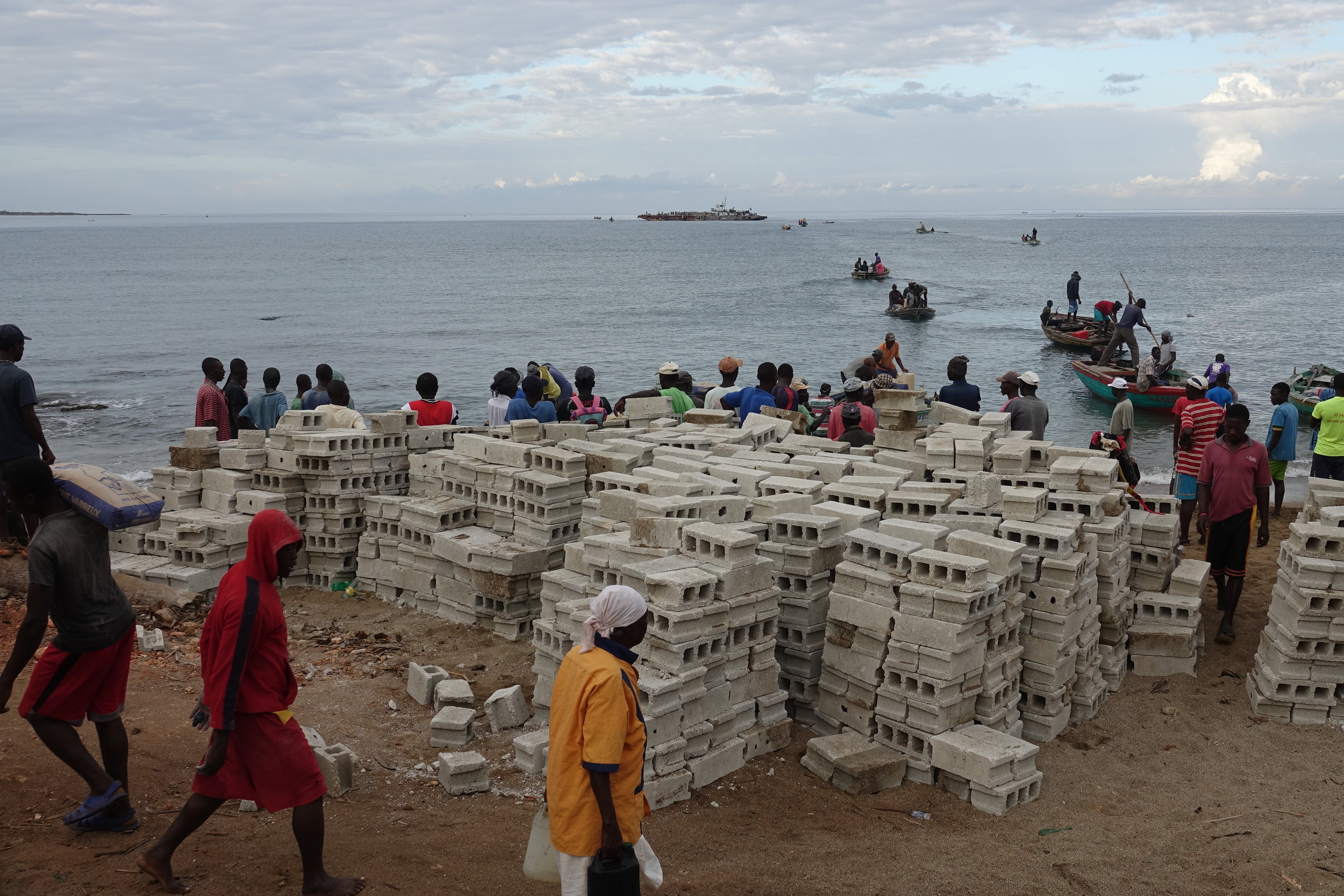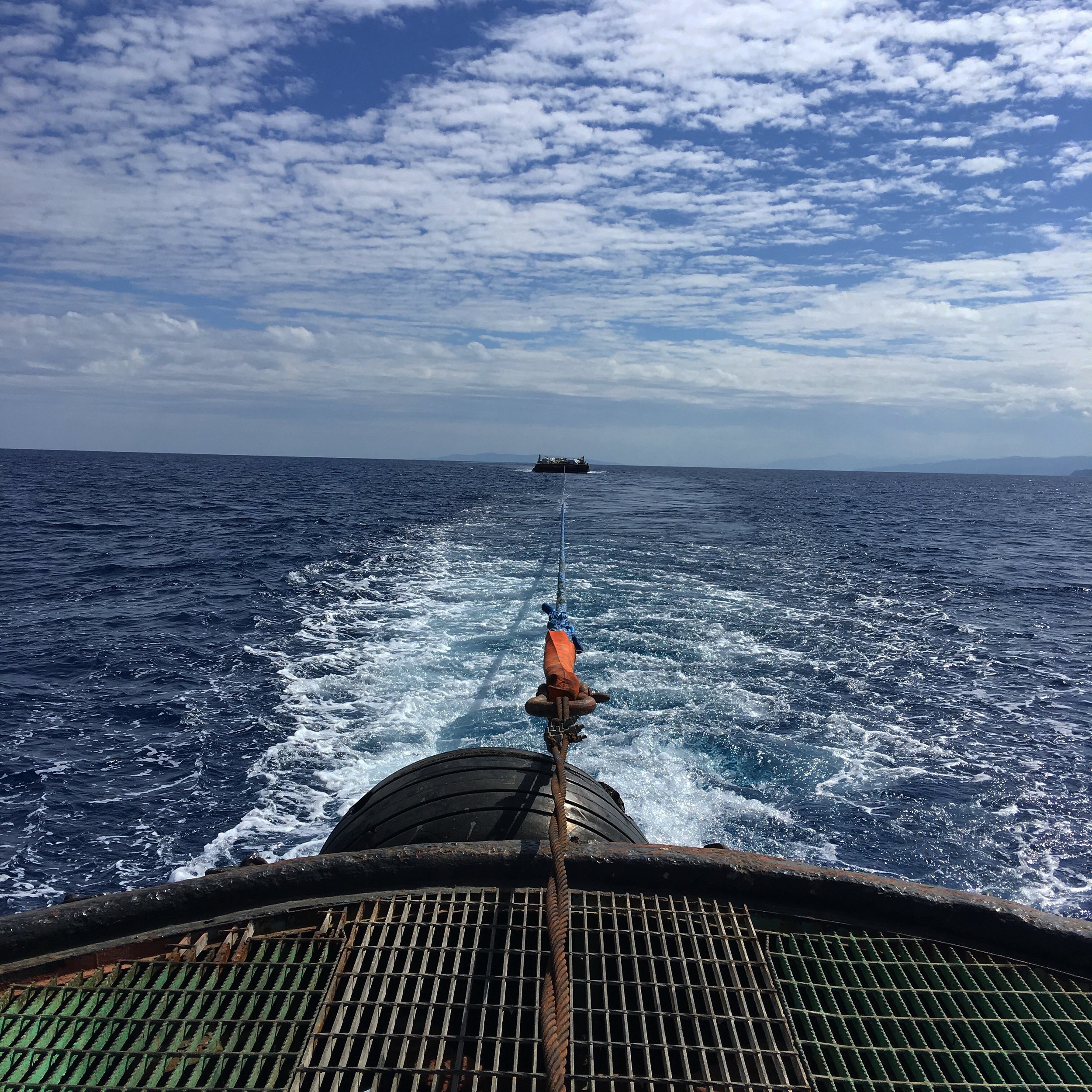Pulled by the Rope of Love: Updates on Our Response to Hurricane Matthew
/by Father S. Enzo Del Brocco, C.P.
As many of you may already know, two weeks ago Fr. Rick and I traveled by sea on a barge carrying one million pounds of supplies. Among the much-needed items we were transporting to the people in the region of Grand’Anse affected by Hurricane Matthew were rice, beans, seeds, and construction materials (items such as cement sacks, blocks, iron bars, and metal sheets). It was amazing to see such a big barge with so much weight on it pulled by a small tugboat with only one thick rope. We left the port of Port au Prince at 4 PM and arrived at 2PM the following day. Most of the trip was done by night in the darkness. On one hand, it was amazing to see the sky full of stars with the different constellations, along with the north star and the southern cross.
I really felt the words of Psalm 8: “When I see your heavens the work of your fingers, the moon and stars that you set in place, what is man that you are mindful of him, and the son of man that you care for him?”
On the other hand, it was scary because we realized that the boat had no lights. We asked the captain if he had radar, and he answered that the only thing he had was a GPS. We asked him if there would be another boat in our path what would happen? His answer was, “Well, I hope they would have lights!”
This made me feel how so many times spiritually we live in darkness, knowing only the direction we want to head. How many saints lived in darkness, and the only thing they had clear was the direction of following Christ. Because of this, in our journey of life we’re not vagabonds, we are pilgrims. While the vagabonds and the pilgrims face the same problems and the same dangers, the pilgrims have a direction and goal. As pilgrims, we are guided to reach out to our brothers and sisters in need because we know that they are Christ in disguise.
During our journey, our captain was nice enough to provide us with mattresses to sleep on the deck. That’s when Fr Rick said, “Finally after 30 years I’m having my cruise on the Caribbean!” As we looked at the stars, being rocked by the waves we fell asleep like babies.
We woke up before dawn and while the sun was rising we could see something floating in the water on both sides. On one side were beautiful dolphins, jumping in and out of the water accompanying the tugboat. On the other side we were accompanied by a huge amount of garbage which was really heartbreaking. The images that we usually have of the Caribbean Sea are of clear turquoise waters. It was painful to see the waste in the water and the damage being done to God’s creation. The contrast of having on one side the dolphins and the other side the garbage made me think of the many contradictions of life, and how often they exist side by side without us acknowledging. As even Pope Francis wrote in Laudato sii 49 : “many professionals, opinion makers, communications media and centres of power, being located in affluent urban areas, are far removed from the poor, with little direct contact with their problems. They live and reason from the comfortable position of a high level of development and a quality of life well beyond the reach of the majority of the world’s population. This lack of physical contact and encounter, encouraged at times by the disintegration of our cities, can lead to a numbing of conscience and to tendentious analyses which neglect parts of reality. At times this attitude exists side by side with a “green” rhetoric. Today, however, we have to realize that a true ecological approach always becomes a social approach; it must integrate questions of justice in debates on the environment, so as to hear both the cry of the earth and the cry of the poor.”
Walls may keep us from seeing what is on the other side, but cannot deny what exists. Bridges instead are a way for us to be connected and reach out. Pope Francis is continuously inviting us to build bridges instead of walls. In fact another way to call the pope is “pontiff”, which means “bridge builder” because it comes from the Latin word “pontifex” and the barge for us was a like bridge allowing us to reach out to the cry of the poor.
At 2PM we finally arrived in the bay of our destination and it took an hour to position the barge and set down the anchor. Before leaving Port au Prince the owner of the barge estimated that we would stay at least a week unloading the one million pounds of supplies. He had no idea what we had organized with the local people. As we were arriving and positioning the barge, it was amazing to see more than 30 little boats coming towards us, full of people ready to help unload the barge. Their cheerfulness and joy in seeing us arrive brought tears to my eyes.
We only had two hours to unload before it became dark. The following morning at dawn, again the boats arrived to help unload. So many people working, unloading the barge to their boats and from their boats to the shore. A beautiful chain of people and boats coming and going, and it was all done by 10 o’clock in the morning!
The huge barge, the huge weight and the huge amount of people was certainly amazing. But many times, like in a picture, what captures your attention is the detail, and I wish to share a few of them with you.
The first detail was the children who came onto the barge. Obviously they didn't have the strength to help us unload the heavy things, but they wanted to participate. As some cement bags had broken, with a broom and shovel and some plastic bags we had them collect the cement that had spilled onto the barge. What was amazing to me was their happiness and eagerness to participate with their fathers, and I could already see them 20-30 years from now telling their children this amazing story of their life and I started to recall the many things that I participated in with my family when I was a kid.
Their material contribution could appear minimal, but I found their participation inspiring, especially if you think of what these children are exposed to in these areas compared to children of the developed countries. They probably ended up having more cement powder on themselves than what went into the bags, but they were having a great time. The whole scene was amazing for us, but I think we can’t imagine what it was like through their eyes and to be able to participate actively in it.
The second detail regards a man who had a large abscess on his face and probably worked more than anyone else. The community leaders had decided ahead of time how many people would participate, because at the end of the day we would have to pay them. After Fr Rick paid the leaders, this man came forward asking for money for the work he did. Fr Rick answered that he had already paid the leaders who would pay the workers. That’s when we discovered that he was not one of the “chosen ones” and yet (that) he was somehow able to arrive onto the barge to work.
I recalled to mind the gospel passage of the syrophoenician woman who “begged Jesus to drive the demon out of her daughter: He said to her, ‘Let the children be fed first. For it is not right to take the food of the children and throw it to the dogs’. She replied and said to him, ‘Lord, even the dogs under the table eat the children’s scraps’.” (Mk 7:26-28)
The man very humbly just said, “I apologize for not following the rules but I came not to ask help for myself but because I have children to be fed. Whatever you can give me I accept.”
We all recognized that he was the one who worked more than anyone else. And so Rick, although he empathized what was the “law”, broke down the “wall” and built a bridge to this man by giving him not only what he deserved for his work, but also promising to help him with his abscess.
Grace does not have borders, and no matter to what nation, race or condition you belong to, there is no wall that can be an obstacle to the flow of God’s grace that is destined to every human being. This is why we are called as Christians to stretch ourselves to the margins so that everyone can be healed by God’s grace.
After everyone left we decided to enjoy the sea having a swim. After that we started to prepare ourselves to head back to Port au Prince by barge. But then the captain told us that the barge had to stop in Jeremie, so we called Cesar and Raphael who were nearby in Dame Marie, to send a little boat to come and get us.
We were looking forward to get to Dame Marie to enjoy a nice meal of local lobster that I just bought from a local fisherman to be cooked by Nebez’ aunt, a nice rest, and then to head back to Port au Prince by car for a 9 hour drive. Not even yet on shore in Dame Marie, we received an emergency call to pick up a young man in the local clinic who had his scapula broken in a motorbike accident. They asked us if we would be able to take the kid to the closest decent hospital that is in Les Cayes. We said yes. We only had the time for a quick shower, leaving the lobsters and beautiful meal on the table to be enjoyed by others, and giving up a comfortable ride as we had to squeeze in two more people into the pickup. In a way, we relived what Jesus did with his disciples when he invited them to rest after their apostolic ministry but were assailed by the crowd: “When he disembarked and saw the vast crowd, his heart was moved with pity for them, for they were like sheep without a shepherd; and he began to teach them many things. By now it was already late and his disciples approached him and said, ‘This is a deserted place and it is already very late. Dismiss them so that they can go to the surrounding farms and villages and buy themselves something to eat.’ He said to them in reply, ‘Give them some food yourselves.’ But they said to him, ‘Are we to buy two hundred days’ wages worth of food and give it to them to eat?’ He asked them, “How many loaves do you have? Go and see.’ And when they had found out they said, ‘Five loaves and two fish.’ (Mk 6: 34-38)
How couldn't we take this young man with us? And despite our fatigue and all of the discomfort riding such rocky roads, we were still able to laugh and have fun like those children on the barge because we knew that by offering the little strength that we still had, God was able to pull us like the tugboat pulling the barge on the sea by His thick and strong rope of love.







